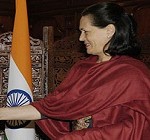As the Indian television channels fell over each other to cover in minute detail, the unseemly succession drama of the Chief Minister of Karnataka, and the Comptroller and Auditor General’s naming of Delhi Chief Minister Sheila Dixit in the graft and corruption surrounding the India-hosted Comomwealth Games, by 2.30 pm this afternoon (August 4), foreign television agencies the BBC and Agence France-Presse reported that Sonia Gandhi, head of India’s ruling Congress Party, has undergone surgery in the United States. The foreign news reports named Gandhi’s spokesperson, Janardhan Dwivedi, as the source of the information. Dwivedi stated that Gandhi would be away, recuperating, for up to three weeks.
The news of Sonia Gandhi’s undisclosed illness and secret departure has come as a shock to Indians, who of late, have been feeling distanced from their government and are reeling from disclosures of massive graft by politicians and a failure to control inflation. Democratic institutions like the media and the Parliament, which should have disclosed Gandhi’s condition as a matter of public knowledge, have kept silent.
The Congress Party carries no notice of its leader’s illness on its website, and it is significant that its spokesperson confirmed the news first to the foreign press. If it felt it could not trust the Indian media with responsible reportage, the Indian media as a collective, has given it good reason. It is, increasingly part of the cozy nexus of politicians and bureaucrats in Delhi, and is often partisan in its coverage, scoffing at the public’s right to know important events. India’s Parliament, whose monsoon session began August 1 and is debating, fiercely, the crippling price rises facing the citizen, has chosen to be quiescent in its ignorance of a vital development – one that could presage major changes in the ruling party and the dispensation of the country. (Neither Sonia Gandhi nor her son Rahul Gandhi, have been seen in Parliament, assuming his presence by her side.)
From here on, it’s a matter of speculation about the schedule for Rahul Gandhi to be anointed the next leader of the Congress Party and the government. While away, Sonia Gandhi has, in true family business style, left the Congress Party in the charge of her four trusted lieutenants – Defence Minister A K. Anthony, spokesperson Janardhan Dwivedi, her political secretary Ahmed Patel, and her son Rahul Gandhi. The senior leadership, comprising Prime Minister Manmohan Singh or Finance minister Pranab Mukherjee, and even Rahul’s mentor Digvijay Singh, have been left out of the inner circle of caretakers.
Will Rahul ascend the party seat immediately, or will A.K. Anthony, the only central minister in the caretaker’s group, be the prince’s regent? It is possible that within the party’s innards, a dark horse could emerge, namely Robert Vadra, son-in-law of Sonia Gandhi recently revealed to be a property magnate with vast but undeclared financial capacities.
The transition for India could be a dangerous one, with its democratic institutions already corroded by political corruption and dynastic politics and its economy in rigor motis from lack of any serious economic reform for the last seven years of Congress rule. India youth, comprising more than half the country, are yearning for a better life, and equal opportunity. Instead, it is being fed on the gruel of political nepotism and graft. Rahul Gandhi, seen as a breath of fresh air for Indian politics, with his quest to democratize the Congress party and build its youth wing, has achieved neither. Clearly the party remains a closed family business, with India as the jewel in the crown, just as it was for the East India Company.
It would be fair to assume that Sonia Gandhi has known for a while that she has a condition requiring surgery more serious than can be handled in India – despite India now counting itself as a destination for medical tourism. Certainly, U.S Secretary of State Hillary Clinton, who was in India July 20 for the US-India Strategic Dialogue, and who met Gandhi, must have been privy to the latter’s forthcoming medical visit to the U.S.
Should Rahul be suddenly anointed as party president and perhaps Indian prime minister, expect support from the United States. Gandhi further cemented her family’s legacy as the primary actor in regional politics by concluding another important foreign policy moment – On July 25, she went to Dhaka to accept an award given by Bangladesh posthumously to her mother-in-law India Gandhi for her contribution to Bangladesh’s liberation in 1971.
Should Rahul become India’s next Prime Minister, we can expect continuity in India’s external relations – part of which is no change with regard to India’s long and frustrating quest for an end to Pakistani support for terrorism against India.
Can Indians hope that the Congress Party, with its glorious independence history, will have the maturity to elect one from amongst itself, a professional in public service – or will we have a replay of 1984 when Rajiv Gandhi became prime minister after his mother’s assassination? Is it possible that at this moment of crisis, the limp Indian opposition will cohere into a credible force, and act responsibly to keep this large democracy viable and a model for other emerging nations seeking the same path? Or will India take the Pakistan route, becoming an estate to be handed over from generation to generation?
Neelam Deo is Director, Gateway House: Indian Council on Global Relations and former Ambassador, Denmark and Ivory Coast.
Manjeet Kripalani is the Executive Director of Gateway House: Indian Council on Global Relations and the former India Bureau Chief of Businessweek magazine.
This article was exclusively written for Gateway House: Indian Council on Global Relations. You can read more exclusive content here.
For interview requests with the author, or for permission to republish, please contact outreach@gatewayhouse.in.
© Copyright 2011 Gateway House: Indian Council on Global Relations. All rights reserved. Any unauthorized copying or reproduction is strictly prohibited.


